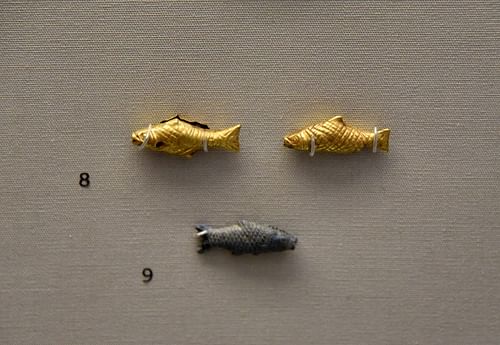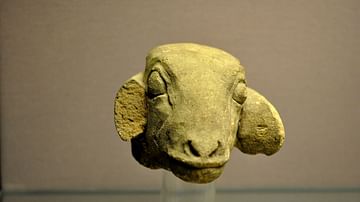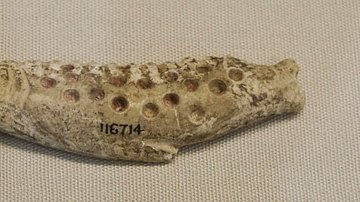The Debate Between Bird and Fish (c. 2000 BCE) is a Sumerian poem dated to the Ur III Period (2047-1750 BCE) when the genre of the literary debate was especially popular. The poem is the earliest extant on the theme of difficult neighbors and how quickly problems can escalate.

The work is one of seven famous literary debates, representing a genre that was popular in the late 3rd millennium BCE, in which two characters – inanimate objects, animals, seasons – argue over which is more important, or a legal dispute, and the matter is finally resolved by the judgment of a god. The seven are:
- The Debate Between Summer and Winter
- The Debate Between Sheep and Grain
- The Debate Between Bird and Fish
- The Debate Between Tree and Reed
- The Debate Between Silver and Mighty Copper
- The Debate Between Hoe and Plough
- The Debate Between Millstone and Gulgul-stone
There are four other known literary debates, but these feature human characters and, based on the small number of copies found, do not seem to have been as popular. The debate genre formed part of the curriculum of the edubba ("House of Tablets"), the Sumerian scribal school, and the poems were copied, memorized, and recited, along with other complex pieces, as part of a student's final course of study before graduation.
Literacy was a priority of the second king of the Ur III Dynasty, Shulgi of Ur (r. 2029-1982 BCE), who increased the number of schools in his territories to train scribes in ancient Mesopotamia. The Debate Between Bird and Fish includes a homage to Shulgi as it is he, instead of a god, who resolves the dispute at the end.
Summary & Commentary
The poem begins as a creation myth. After the gods Anu (An) and Enlil have established the heavens and earth, Enki (god of wisdom, also referenced as Nudimmud) lays out the marshlands around his city of Eridu, provides for the Sumerians ("the black-headed" referenced in line 9), and places fish and birds in their proper places after instructing them on how to behave (lines 1-21).
Problems begin when Fish objects to the behavior of his neighbor Bird, claiming she is too loud, and then insults her further. Bird responds with her own insults, and the argument escalates (lines 22-101). Fish decides to settle the problem by destroying Bird's nest and killing her young, and when Bird returns and finds the wreckage, she seeks out Fish's spawn and kills them (lines 102-121). Their argument escalates further, and they bring their case before Shulgi, depicted as a son of Enlil, to resolve the issue (lines 122-147).
Shulgi decides in favor of Bird, citing her sweet singing voice and the pleasure she brings to banquets and the E-kur (temple). Shulgi's judgment (lines 168-177) has been interpreted by some scholars, including Jeremy Black, as resting "as much on the pleasure created to man and the gods by Bird's beautiful plumage and attractive singing" as anything else (230). While this may be so, the piece is fragmented toward the conclusion, and Shulgi's judgment no doubt went further than only the lines preserved.
It is likely, as Black also notes, the Shulgi's judgment was also based on "Fish's savage attack on Bird's eggs" (230) and the fact that Fish started the trouble in the first place. The piece ends with praise to Enki whose wisdom would have inspired Shulgi to award the legal victory to Bird over Fish. Although the poem would have served as entertainment, it would also have emphasized the importance of getting along with one's neighbors in accordance with the will of the gods.
Text
The following text is taken from The Literature of Ancient Sumer, translated by Jeremy Black, et al. and from the Electronic Text Corpus of Sumerian Literature, translated by the same. Ellipses indicate missing words or sentences and question marks alternate translations of a word.
1-12: In those ancient days, when the good destinies had been decreed, and after An and Enlil had set up the divine rules of heaven and earth, then the third of them, ..., the lord of broad wisdom, Enki, the master of destinies, gathered together ... and founded dwelling places; he took in his hand waters to encourage and create good seed; he laid out side by side the Tigris and the Euphrates, and caused them to bring water from the mountains; he scoured out the smaller streams, and positioned the other watercourses. ... Enki made spacious sheepfolds and cattle-pens and provided shepherds and herdsmen; he founded cities and settlements throughout the earth and made the black-headed multiply. He provided them with a king as shepherd, elevating him to sovereignty over them; the king rose as the daylight over the foreign countries.
13-21: ... Enki knit together the marshlands, making young and old reeds grow there; he made birds and fish teem in the pools and lagoons ...; he gave ... all kinds of living creatures as their sustenance, ... placed them in charge of this abundance of the gods. When Nudimmud [Enki], august prince, the lord of broad wisdom, had fashioned ..., he filled the reed-beds and marshes with Fish and Bird, indicated to them their positions and instructed them in their divine rules.
22-28: Then Fish laid its eggs in the lagoons; Bird built its nest in a gap in the reed-beds. But Bird frightened the Fish of the lagoons in its ... Fish took up a stand and cried out. Grandiosely it initiated hostilities. It roused the street by quarrelling in an overbearing manner. Fish addressed Bird murderously:
29-40: "... Bird, ... there is no insult ...! Croaking, ... noise in the marshes ... squawking! Forever gobbling away greedily, while your heart is dripping with evil! Standing on the plain, you can keep pecking away until they chase you off! The farmer's sons lay lines and nets for you in the furrows. The gardener sets up nets against you in gardens and orchards. He cannot rest his arm from firing his sling; he cannot sit down because of you. You cause damage in the vegetable plots; you are a nuisance. In the damp parts of fields, there are your unpleasing footprints. Bird, you are shameless: you fill the courtyard with your droppings. The courtyard sweeper-boy who cleans the house chases after you with ropes. By your noise the house is disturbed; your din drives people away."
41-50: "They bring you into the fattening shed. They let you moo like cattle, bleat like sheep. They pour out cool water in jugs for you. They drag you away for the daily sacrifice. The fowler brings you with bound wings. They tie up your wings and beak. Your squawking is to no profit; what are you flapping about? With your ugly voice you frighten the night; no one can sleep soundly. Bird, get out of the marshes! Get this noise of yours off my back! Go out of here into a hole on the rubbish heap: that suits you!"
51-56: Thus, Fish insulted Bird on that day. But Bird, with multicoloured plumage and multicoloured face, was convinced of its own beauty, and did not take to heart the insults Fish had cast at it. As if it was a nursemaid singing a lullaby, it paid no attention to the speech, despite the ugly words that were being uttered. Then Bird answered Fish:
57-69: "How has your heart become so arrogant, while you yourself are so lowly? Your mouth is flabby (?), but although your mouth goes all the way round, you cannot see behind you. You are bereft of hips, as also of arms, hands and feet – try bending your neck to your feet! Your smell is awful; you make people throw up, they bare their teeth at you! No trough would hold the kind of prepared food you eat. He who has carried you dares not let his hand touch his skin! In the great marshes and the wide lagoons, I am your persecuting demon. You cannot eat the sweet plants there, as my voice harasses you. You cannot travel with confidence in the river, as my storm-cloud covers you. As you slip through the reed-beds you are always beneath my eyes. Some of your little ones are destined to be my daily offering; you give them to me to allay my hunger. Some of your big ones are just as certainly destined for my banqueting hall ... in the mud.
70-79: But I am the beautiful and clever Bird! Fine artistry went into my adornment. But no skill has been expended on your holy shaping! Strutting about in the royal palace is my glory; my warbling is considered a decoration in the courtyard. The sound I produce, in all its sweetness, is a delight for the person of Shulgi, son of Enlil. Fruits and produce of gardens and orchards are the enormous daily offerings due to me. Groats, flour malt, hulled barley, and emmer (?) are sweet things to my mouth. How do you not recognize my superiority from this? Bow your neck to the ground!"
80-85: Thus, Bird insulted Fish on that occasion. Fish became angry, and, trusting in its heroic strength and solidness, swept across the bottom like a heavy rain cloud. It took up the quarrel. It did not take to heart the insults that Bird had cast at it. It could not bring itself to submit but spoke unrestrainedly. Again, Fish replied to Bird:
86-94: "Chopped-off beak and legs, deformed feet, cleft mouth, thin tongue! You clatter away in your ignorance, with never any reflection! Gluttonous, malformed, filling the courtyard with droppings! The little sweeper-boy sets nets in the house and chases you with ropes. The baker, the brewer, the porter, all those who live in the house are annoyed with you. Bird, you have not examined the question of my greatness; you have not taken due account of my nature. You could not understand my weakness and my strength; yet you spoke inflammatory words. Once you have really looked into my achievements, you will be greatly humbled. Your speech contains grave errors; you have not given it due consideration."
95-101: "I am Fish. I am responsibly charged with providing abundance for the pure shrines. For the great offerings at the lustrous E-kur, I stand proudly with head raised high! Just like Acnan I am here to satisfy the hunger of the Land. I am her helper. Therefore, people pay attention to me, and they keep their eyes upon me. As at the harvest festival, they rejoice over me and take care of me. Bird, whatever great deeds you may have achieved, I will teach you their pretentiousness. I shall hand back to you in your turn your haughtiness and mendacious speech."
102-115: Thereupon Fish conceived a plot against Bird. Silently, furtively, it slithered alongside. When Bird rose up from her nest to fetch food for her young, Fish searched for the most discreet of silent places. It turned her well-built nest of brushwood into a haunted house. It destroyed her well-built house and tore down her storeroom. It smashed the eggs she had laid and threw them into the sea. Thus, Fish struck at Bird, and then fled into the waters. Then Bird came, lion-faced and with an eagle's talons, flapping its wings towards its nest. It stopped in mid-flight. Like a hurricane whirling in the midst of heaven, it circled in the sky. Bird, looking about for its nest, spread wide its limbs. It trampled over the broad plain after its well-built nest of brushwood. Its voice shrieked into the interior of heaven like the Mistress's.
116-121: Bird sought for Fish, searching the marshes. Bird peered into the deep water for Fish, watching closely. Extending its claws, it just snatched from the water Fish's tiny fish-spawn, gathering them all together and piling them up in a heap. Thus, Bird took its revenge and ... its heart. Again, Bird replied to Fish:
122-124: "You utter fool! Dumb, muddle-headed Fish, you are out of ...! The mouths of those who circle (?) the quay never get enough to eat, and their hunger lasts all day. Swine, rascal, gorging yourself upon your own excrement, you freak!"
125-136: "You are like a watchman living on the walls (?), ...! Fish, you kindled fire against me, you planted henbane. In your stupidity you caused devastation; you have spattered your hands with blood! Your arrogant heart will destroy itself by its own deeds! But I am Bird, flying in the heavens and walking on the earth. Wherever I travel to, I am there for the joy of its ... named. ..., o Fish, ... bestowed by the Great Princes (a name for the Igigi). I am of first-class seed, and my young are first-born young! ... walks with uplifted head ... to the lustrous E-kur. ... until distant days. ... the numerous people say. How can you not recognize my pre-eminence? Bow your neck to the ground."
137-140: Again, Bird had hurled insults at Fish. Then Fish shouted at Bird, eyeing it angrily: "Do not puff yourself up from your lying mouth! Our judge shall take this up. Let us take our case to Enki, our judge and adjudicator."
141-147: And so, with the two of them jostling and continuing the evil quarrel in order to establish, the one over the other, their grandness and pre-eminence, the litigation was registered within Eridu, and they put forward their argumentation ... thrashing about (?) amid roaring like that of a bull, ... crept forward like ... They requested a verdict ... from King Shulgi, son of Enlil.
148-157: (Bird speaks:)"You ..., lord of true speech, pay attention to my words! I had put ... and laid eggs there. ... had bestowed ... and had given as their sustenance. After ... had started ..., ... he destroyed my house. He turned my nest of brushwood into a haunted house. He destroyed my house and tore down my storeroom. He smashed my eggs and threw them into the sea. ... examine what I have said. Return a verdict in my favor." ... investigating ..., she prostrated herself to the ground.
158-163: ... announced (?) the word. ... august, spoke from the heart: "Your words are sterling words, such as delight the heart." (Shulgi speaks:) "For how long are they going to persist (?) in quarrelling?" Like ... came out supreme. Like butting ..., they jostled each other.
164-167: (Fish speaks:) "..., let it be favorable to me!" (Shulgi speaks:) "I shall instruct you in the divine rules and just ordinances of our dwelling-place. Like (?) Enki, king of the abzu, I am successful in finding solutions, and am wise in words." He answered Bird and Fish:
168-177: "To strut about in the E-kur is a glory for Bird, as its singing is sweet. At Enlil's holy table, Bird ... precedence over you ...! It shall utter its cries in the temple of the great gods. The Anuna gods rejoice at its voice. It is suitable for banquets in the great dining hall of the gods. It provides good cheer in the king's palace. ... with head high, at the table of Shulgi, son of Enlil. The king .... long life.
1 line fragmentary
Fish ... in splendor ...178-190: Thereupon Fish ... Bird.
6 lines missing or fragmentary
... Enki ... bestowed.
1 line fragmentary
In the abzu of Eridu ... Bird ... Because Bird was victorious over Fish in the dispute between Fish and Bird, Father Enki be praised!










